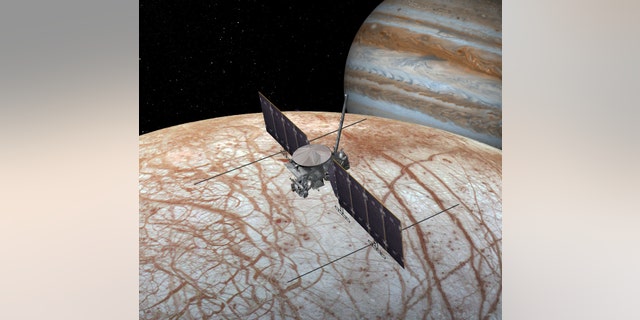NASA has officially confirmed a mission to Jupiter's moon Europa, a trek that could answer whether the icy celestial body could be habitable for humans and support life.
Known as the Europa Clipper mission, which was originally explored in 2017, the government space agency is now in the phase of completing the final design of the spacecraft that will visit the moon. From there, it will move on to construction and, ultimately, test the spacecraft and science payload.
“We are all excited about the decision that moves the Europa Clipper mission one key step closer to unlocking the mysteries of this ocean world,” said Thomas Zurbuchen, associate administrator for the Science Mission Directorate, in a statement. “We are building upon the scientific insights received from the flagship Galileo and Cassini spacecraft and working to advance our understanding of our cosmic origin, and even life elsewhere.”

(Credit: NASA)
MYSTERIOUS ALTERNATING CURRENTS FOUND ON JUPITER
A 2018 study expressed concerns that Europa's surface may be extremely porous, which could harm any probe that touches down on its surface.
The space agency said the purpose of the mission will be to investigate whether Europa, the sixth-largest of Jupiter's 79 known moons, "could harbor conditions suitable for life, honing our insights into astrobiology."
The conditions on Europa have been previously likened to exoplanet Barnard B, a "super-Earth" 30 trillion miles from Earth. It likely has a surface temperature of roughly 238 degrees below zero and may have oceans underneath its icy surface, according to a July 2018 statement from NASA.
It's unclear what the oceans on Europa are made up of, but the Hubble Space Telescope detected the presence of sodium chloride (NaCl) on its surface, according to a study published in June.
"If this sodium chloride is really reflective of the internal composition, then [Europa's ocean] might be more Earth-like than we used to think," the study's lead author, Samantha Trumbo, told Space.com.
NASA said its goal for the Europa Clipper mission is to launch as soon as 2023, but it added that its baseline commitment "supports a launch readiness date by 2025."
CLICK HERE TO GET THE FOX NEWS APP
https://www.foxnews.com/science/nasa-explore-jupiters-moon-europa
2019-08-21 12:43:53Z
52780358176349
Tidak ada komentar:
Posting Komentar